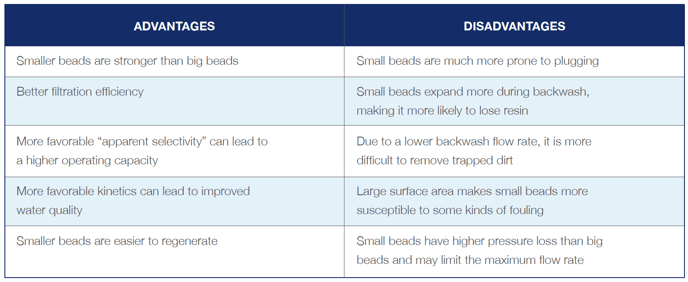- Knowledge Base
- Softening
-
Softening
-
Groundwater & Wastewater
-
Municipal Water Treatment
-
Fundamentals of Ion Exchange
-
Activated Carbon
-
Deionization
-
Emerging Contaminants
-
Ion Exchange Leachables
-
Non-Aqueous
-
Chemistry
-
Condensate Polishing
-
Ion Exchange Troubleshooting
-
Resin Sampling & Testing
-
Water Quality Standards
-
Metals Removal
-
Specialty Media
-
Dealkalization
-
Dialysis
-
Resin Filling, Removal, Storage, & Disposal
-
Industrial Applications
-
Equipment Guidelines
-
Resin Fouling & Cleaning
-
Portable Exchange DI (PEDI)
-
Removal of Oxygen
-
Nuclear
-
Chemical Specifications
-
Sugar
-
Organics Removal
-
Lab Water
-
Silica
-
Ultrapure Water
-
Water Testing
Fine Mesh Resin
The advantages and disadvantages of fine mesh resin.
DESCRIPTION
Fine mesh resin generally refers to any resin with a particle distribution smaller than the standard 16-50 mesh size. Most fine mesh resins are 40-60 mesh size, although some extra fine mesh resins (80-100 mesh) are used in limited applications.
USES
Fine mesh resins have slightly better kinetics and more favorable apparent selectivities than standard mesh resin. They can be used to improve chemical efficiency in clean water applications in equipment that is designed specifically for fine mesh resin. Fine mesh resins are not suitable for high flow rate applications or for use with water supplies that contain high levels of turbidity.

